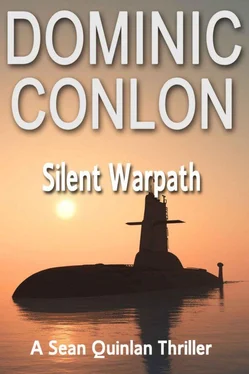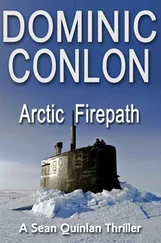The update to Cetus’ mission software was in the briefcase beside her. As they approached, the shape became more sharply defined. Natasha could make out the glistening black colour and the short stubby sail. Their launch dragged a thin line behind them. When they clambered on board, two sailors from the shuttle would haul on the line until a thick hawser from the cruiser appeared.
There had been some discussion about the best method of towing the sub back to base. The entire outer surface of Cetus was covered in soft rubber tiles which absorbed radar frequency waves, making it invisible to anyone trying to track its progress.
The outer shell of the sub was also bereft of lugs or any projection to which they could attach a towing line. Louis explained that the design called for a completely smooth profile, so it glided through the water without making any turbulence which might be picked up by enemy sonar.
They finally settled on a couple of magnetic grabs which were tied to the end of the hawser and which the sailors would use to secure Cetus.
The launch slowed to come alongside. Two sailors hopped over onto the slippery rounded back of the sub and held on to the sail. Once they had secured the motor launch with ropes around the sail, they helped Natasha and then Louis across. Louis quickly reached over and undid the outer hatch, hidden at the bottom of the sail. As Cetus bobbed up and down in the water, Louis slowly descended the ladder into the dark belly of the sub, followed more nimbly by Natasha.
This was the first time Natasha had been on-board Cetus while it was at sea. Louis helped her down the last part of the narrow ladder and found a switch which illuminated the interior.
She stared down a long narrow corridor which extended along the front half of the boat. Nearly all the rear half was blanked off by a large steel round door protecting the engine compartment and nuclear power generator. Along both sides of the fore gangway, computer racks reached the full height of the sub. Natasha could see the racks were bolted both on the floor and ceiling and she saw hundreds of green LED lights winking amongst them. She shivered. It was cold and the air was stale, though a fresh breeze was starting to find its way in through the sail hatchway.
On the surface the sub rode the swell, nose moving up and down over the crests. Louis was already at the fore end, checking a server in the first rack on the port side. Natasha carefully made her way towards him and stopped at the computers three racks further down. These were her babies, covering mission loading, sequencing and the main decision making electronics. She grabbed a small hand torch from her bag, checking the serial numbers of the computers until she found the one she was looking for. She pulled out the flat shelf underneath, revealing a keyboard and a flat panel screen which she pivoted into an upright position. She called up the current mission profile and swiftly disabled it. Confident that this software could never work again, she bent down to retrieve the USB memory stick from her bag.
Within five minutes both Louis and Natasha had completely disabled the sub and loaded new programs which would ensure it could be safely towed back to its home port.
* * *
‘Murmansk to the US east coast is nearly 4,000 miles.’ Lomax traced the path the task force would take. ‘We know they’re moving at about 20 knots, not taking any chances with the tow.’
‘That’s over a week to return to base’ noted DD. ‘And we’ve been back five days.’
‘The task force should be moving through the edge of a storm front. Can you confirm their position?’
‘Easy’ said DD as he turned to his laptop. Two minutes later he showed Lomax the location on the screen.
Lomax looked carefully at the detailed map. ‘I think now would be a good time.’
DD opened up the communications software. He glanced at Lomax for confirmation.
‘Do it now.’
DD clicked on the Initiate module, establishing a new communication session. Satisfied it was working, he clicked on the button to trigger an upload of a new mission profile.
Just over a thousand miles away in the northern Atlantic, wind speeds picked up to force four and the swell increased by ten feet as the ships faced into the storm. A quartering wind blew spume from the wave crests.
Every sixty minutes the stern lookout flicked on powerful floodlights to check the position of the tow. He could see the two hawsers stretching out across the white wave tops, but it was difficult to make out the black shape of Cetus being towed 50 metres away. The lookout switched off the floodlights and made a note in his log.
Cetus quietly fed power to the armature of its electric engine. As the screw moved the machine slowly towards the towing ship, the line went slack in the water. Twenty metres away Cetus reversed its screw, creating a white foaming torrent in the water. The sub started to reverse, picking up speed. At its furthest extent one steel cable snapped up out of the water with a loud twang. As Cetus continued to reverse the cable began to hum under the strain. The hum increased in pitch.
The noise of the gale drowned out the ‘crack’ as first one and then the other magnetic grabs lost their hold. Cetus slowly sank beneath the waves.
When the lookout switched on the floodlights again some fifty minutes later, the hawsers were slack. Initially he was not unduly worried as the storm had driven the sub closer to the ship several times before. He picked up a pair of binoculars and searched for some sign of the submarine amongst the forest of waves. After two minutes he reluctantly used the intercom to report to the Officer of the Deck.
* * *
‘So how long have you known about this?’ Dinsdale’s face was red with anger.
‘Not that long Martin’ replied Prime Minister John Ashdown. ‘An opportunity arose during the course of the mission. I thought it was too good to pass up.’
Dinsdale started pacing about the PM’s office. At last he came to stand in front of the Prime Minister’s desk. ‘You’re finished’ he said simply. ‘Once word of this gets out, you, me and the rest of the government will be forced to resign.’
‘But word will not get out, will it Martin?’
‘How can you stop it? Too many people know about it.’
‘That’s not true. There are only seven people in the world who know about this. And now you’re the eighth.’
Dinsdale sank into the nearest chair. ‘John, I really think you should resign. You could go now without too much fuss from the media. You could say you had planned to retire anyway, after fifteen years in politics.’
‘And who would take over my role — you?’ asked the PM scathingly.
Dinsdale held up his hands. ‘Well, I am the deputy PM, so I suppose I would stand in until our internal election procedure is complete.’
Ashdown shook his head. ‘No, Martin. I’ll tell you why that isn’t going to happen. If my continued presence in this post is to be put at risk by a leak originating from you, then you don’t know me very well.’
The PM swivelled round in his seat to look at Dinsdale directly. ‘You underestimate my resolve.’
He got up and brought two crystal whiskey glasses to the desk and poured a good measure in each. ‘But I will tell you what is going to happen. In the next seven days I will call a snap reshuffle of the cabinet.’
Dinsdale started to object, but the PM stopped him. ‘Martin I know this will be painful for you, but for the good of the country you have to go.’
‘Then there is nothing else for it..’ Dinsdale said hopelessly. ‘I’d rather take my chances in the country than be sacked as deputy leader.’
The PM rested both elbows on the table. ‘Let’s just imagine that you’ve been working late in the chamber and you stop by for a drink in the commons bar before you set off in your Jaguar for your flat.’ The PM raised his glass. ‘Halfway home, you see a car behind you. It’s revving its engine and trying to overtake. You pull in to let him pass, but it’s driven by a drunk who crashes into your car and sends it spinning across the road. A fire engulfs your car. You’re burnt alive in the wreck.’
Читать дальше




![Джеймс Купер - Зверобой, или Первая тропа войны [The Deerslayer, or The First Warpath]](/books/398571/dzhejms-kuper-zveroboj-ili-pervaya-tropa-vojny-the-thumb.webp)







